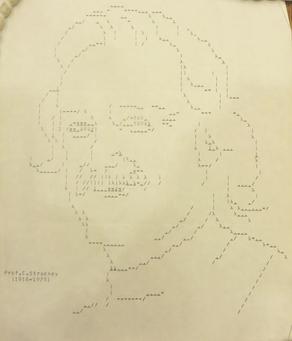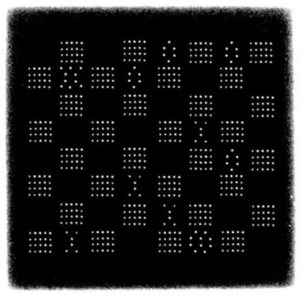Christopher Strachey facts for kids
Quick facts for kids
Christopher Strachey
|
|
|---|---|

Early computer printout of Christopher Strachey in the Bodleian Library, Oxford
|
|
| Born | 16 November 1916 Hampstead, England
|
| Died | 18 May 1975 (aged 58) Oxford, England
|
| Citizenship | British |
| Education | Gresham's School |
| Alma mater | University of Cambridge (BA) |
| Known for | CPL, denotational semantics, Fundamental Concepts in Programming Languages, time-sharing |
| Parent(s) | Oliver Strachey Ray Costelloe |
| Scientific career | |
| Fields | Computer Science |
| Institutions | University of Cambridge, University of Oxford St Edmund's School, Canterbury Harrow School |
| Doctoral students | Peter Mosses David Turner |
Christopher Strachey (born November 16, 1916 – died May 18, 1975) was a very smart British computer scientist. He helped create important ideas about how computer programs work. He also pioneered how computers could be shared by many people at once. Some even say he made the very first video game! He came from a famous family known for their work in many fields.
Contents
Early Life and Learning
Christopher Strachey was born in Hampstead, England. His parents were Oliver Strachey and Rachel (Ray) Costelloe. His family was part of the Bloomsbury Group, which included famous writers and thinkers like Virginia Woolf.
When he was 13, Christopher went to Gresham's School. He was very smart but didn't always do well in school. In 1935, he went to King's College, Cambridge, the same college as Alan Turing. He studied mathematics and then physics. During his time at Cambridge, he had a difficult time with his health and didn't get the highest grades.
Computer Career
After college, Christopher joined a company called Standard Telephones and Cables (STC) as a scientist. His first job was to help design parts for radar using math. The calculations were very complex and needed an early type of computer called a differential analyzer. This experience made Christopher very interested in computers. He worked at STC throughout the Second World War.
After the war, he became a school teacher. He taught math and physics at St Edmund's School, Canterbury, and later at Harrow School.
First Video Game?
In 1951, Christopher met Mike Woodger from the National Physical Laboratory (NPL). This lab had built a smaller version of Alan Turing's computer design, called the Pilot ACE.
In his free time, Strachey started to create a program for the game of checkers. He finished a first version in May 1951. The game used up all the Pilot ACE's memory! He tried to run the game for the first time on July 30, 1951, but it had some errors.
When he heard about the Manchester Mark 1 computer, which had much more memory, he asked Alan Turing for its manual. By October 1951, he had changed his program to work on the Manchester Mark 1. By the summer of 1952, the program could "play a complete game of checkers at a reasonable speed." This game may have been the very first video game!
Computer Music and Literature
Christopher Strachey also programmed the first music ever played by a computer. In 1951, the Mark II Manchester Electronic Computer played the British National Anthem, "God Save the King." Later that year, a BBC team recorded short parts of three songs: "God Save the King," "Baa, Baa, Black Sheep," and "In the Mood." You can still hear these recordings today!
In the summer of 1952, Strachey created a "love letter generator" for the Mark II computer. This is known as the first example of computer-generated literature.
Working with Computers
From 1952 to 1959, Strachey worked for the National Research Development Corporation (NRDC). He visited many computer centers in the United States and studied how their computers worked. He also helped program the Elliott 401 and the Ferranti Pegasus computers. He even helped get patents for new computer designs.
In 1959, Strachey became a computer consultant. He worked for different companies like NRDC, EMI, and Ferranti. He helped design computers and create high-level programming languages, which are easier for people to use.
In 1962, he also started working at the University of Cambridge.
In 1965, Strachey moved to the University of Oxford. He became the first director of the Programming Research Group. Later, he was the university's first professor of computer science.
In 1971, he was honored as a distinguished fellow of the British Computer Society for all his important work in computer science.
Christopher Strachey passed away on May 18, 1975.
Big Ideas and Inventions
Christopher Strachey came up with the idea of time-sharing in 1959. This means that many people can use the same computer at the same time. He shared this idea at a big conference in Paris. His paper on time-sharing is seen as the first important paper on this topic.
He also helped develop the Combined Programming Language (CPL). His famous lecture notes, Fundamental Concepts in Programming Languages, explained important ideas about how computer programs store and use information. Strachey also came up with the term currying, which is a way to work with functions in computer programming.
He was very important in designing the Ferranti Pegasus computer.
He was a pioneer in early video games, creating a version of checkers for the Ferranti Mark 1 computer.
The computer language m4 got many of its ideas from Strachey's GPM (General Purpose Macrogenerator), which was one of the first languages that could automatically expand short commands into longer ones.
His Legacy
The Department of Computer Science at the University of Oxford has a special position called the Christopher Strachey Professorship of Computing, named after him.
In November 2016, an event called Strachey 100 was held at Oxford University. It celebrated 100 years since his birth. People could see the Christopher Strachey archive, which holds many of his important papers, at the Weston Library in Oxford.
 | Isaac Myers |
 | D. Hamilton Jackson |
 | A. Philip Randolph |


